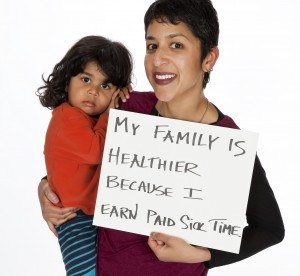The paid and unpaid work of caring for people – young, old, and everywhere in between – is vital to the health of our overall economy.
 The work of caring for people within families is still usually done by women, and is not paid or widely supported by workplace culture or public policies – though it has great value to the people receiving the care, the community, and our economy. As more women have entered the workforce in the last 50 years, more care is being provided within the formal, paid economy – though generally for low wages and minimal benefits. And the people who work as paid caregivers — in child care, home care, nursing homes, early education, and health care — are also caring without pay for their own families, who are often getting by on very low incomes and without access to basic supports like the minimum wage or paid time off.
The work of caring for people within families is still usually done by women, and is not paid or widely supported by workplace culture or public policies – though it has great value to the people receiving the care, the community, and our economy. As more women have entered the workforce in the last 50 years, more care is being provided within the formal, paid economy – though generally for low wages and minimal benefits. And the people who work as paid caregivers — in child care, home care, nursing homes, early education, and health care — are also caring without pay for their own families, who are often getting by on very low incomes and without access to basic supports like the minimum wage or paid time off.
This means that those who need care (children, the elderly, the sick and disabled) and those who provide care (mothers, child care workers, home care workers) have high rates of economic insecurity and poverty.
Our current economy depends on these caregivers, but does not value them or their contribution with adequate compensation or support.
WHAT IS A CARING ECONOMY?
Caring economies support the paid and unpaid work of caring for people of all ages and recognizes the significant value of this work to our broader economy. Without both paid and unpaid care work, our economy would come to a standstill.
These examples that show how support for caregiving encourages economic stability:
- A business manager whose elderly mother needs care can go to work if he has access to in-home care services and if he has the flexibility and time off to provide additional care as needed.
- A teacher can keep her job if she can access and afford quality child care for her own children.
- A salesperson can help her parents age in place if she has the time and flexibility she needs to care for them, as well as the support of in-home care providers.
- A mother can bond with and care for a new baby and still return to her job if she has paid, job-protected time away from work when a baby is born.
WHAT WOULD A CARING ECONOMY LOOK LIKE?
A caring economy would value both paid and unpaid care work by adequately compensating and supporting care providers. In a caring economy we would ensure that people providing care are not forced to sacrifice their economic security to do so.
 Paid care work includes the fields of child care, home health care, nursing home facilities, and education. In a caring economy, people who work in these fields would receive living wages, paid time off, safe working conditions, job security, and training to do their jobs well.
Paid care work includes the fields of child care, home health care, nursing home facilities, and education. In a caring economy, people who work in these fields would receive living wages, paid time off, safe working conditions, job security, and training to do their jobs well.
Unpaid care work includes the work done in families to care for children and aging, disabled, or sick adults. This work is crucial to our society; just imagine if no one ever took care of children or attended our elders. How would they stay safe and healthy, or learn and grow? In a caring economy, families would be able to provide appropriate care without jeopardizing their paid employment or economic security.
THE BUILDING BLOCKS OF A CARING ECONOMY:
- Excellent, affordable child-care and universal early education.
- Elder care with dignity.
- Living wages, appropriate benefits and professional training for workers in child care, early education, home care, and nursing homes.
- Paid family leave and paid sick time that can be used for one’s own and others’ health.
- Secure retirement for all workers, including those who take time out of the workforce in order to provide family care (e.g., stay-at-home parents).
- Workplace flexibility that allows workers to successfully combine work and family.
It will take time to achieve these broad changes, but ultimately we will build a new work/family/care paradigm that works for all caregivers and stregthens our broader economy.
LEARN MORE:
- Download our Caring Economy fact sheet.
- Caring Economy Campaign: http://www.caringeconomy.org/
HOW CAN YOU HELP?
You can help build a caring economy – and let others know how it works too. Here’s how:
- Be a caring employer or boss. Whether you employ a nanny or run an office of 50 (or both), review your HR policies and be sure they include time and respect for care work.
- Support businesses that support their employees in a caring workplace; and if you can’t tell – ask!
- Talk to your elected officials about the care issues that affect you and your family. Many of our elected officials do not understand the day-to-day challenges of people who are balancing paid work and family care – or the financial insecurity many caregivers face. They need to hear from you!
- Tell your stories. Talking and sharing our own stories of managing paid work and family caregiving is a powerful way to keep a spotlight on the importance of caregiving – and let others know it’s a community-wide problem, not just a personal one.

